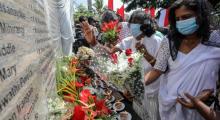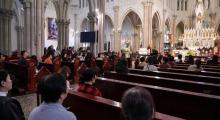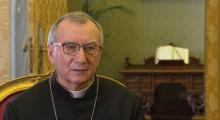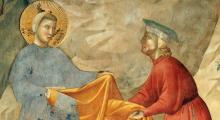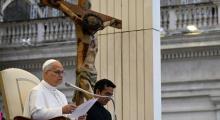Issued by the Catholic Center for Studies and Media - Jordan. Editor-in-chief Fr. Rif'at Bader - موقع أبونا abouna.org
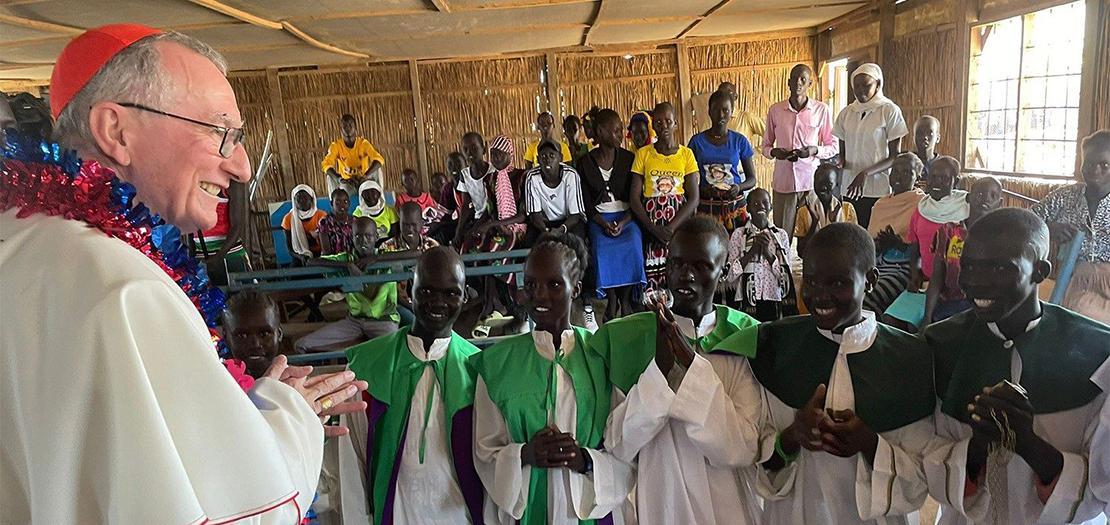
The people of South Sudan must disarm evil with forgiveness, defuse violence with love, and resist oppression with meekness, because evil cannot be overcome by this world’s weapons and peace cannot be achieved through war.
The Vatican’s Secretary of State made that appeal in Juba on Thursday as he celebrated Mass in the John Garang Mausoleum Park.
As rain fell, Cardinal Parolin invoked God’s blessings upon South Sudan, calling it a land “rich in resources and possibilities” but one which is also “overshadowed by violence.”
The President of South Sudan, Salva Kiir, sat in the front row at the celebration, in the grandstand set up under a tent. First Vice President Riek Machar was seated beside him. On the penultimate day of his visit to the African nation, Cardinal Parolin told the roughly 15,000 people gathered for the Mass that they are a people "burdened by the yoke of oppression, poverty, and labor", repeating the words of the prophet Isaiah, "but who desire to rejoice in freedom."
The Mass was held in John Garang Mausoleum Park, the memorial dedicated to the late leaders of the Sudan People's Liberation Movement/Army and Sudan's first vice president after the Peace Accords. The venue was the same as where Pope Francis was scheduled to celebrate Mass, before treatment for severe knee pain forced him to postpone his Apostolic Journey.
The colors of South Sudan’s flag surrounded the altar: white, red, green, and yellow. Rain, lightning, and wind did not dampen the spirits of the young people who sang and danced barefoot, wearing white T-shirts and tribal skirts and pants.
All the bishops of South Sudan were present, concelebrating with the Cardinal. The front row was also filled with Anglican, Pentecostal, Evangelical, and other Christian leaders who are members of the Council of Churches, and who met privately with the Cardinal before the Mass.
Booklets with the photograph of "His Eminence Cardinal Pietro Parolin" were distributed, and the atmosphere was more reserved than that of the jubilation heard at Mass on Wednesday in the IDP camp in the northern town of Bentiu.
Yet, as in Bentiu, Cardinal Parolin began his homily by offering "the greeting and blessing of the Holy Father Pope Francis, who was very much desired to be here today for an ecumenical pilgrimage for peace and reconciliation in this young country, so full of opportunities and so gravely afflicted."
The Cardinal reflected on both the present of the South Sudanese people—their difficulties and challenges—while looking to their future. He pointed the path forward, which he said is that of the Gospel which offers a "different" message, namely to "refuse to respond to evil with evil."
"Renounce revenge... Always love and forgive," the Cardinal told South Sudanese, who have endured years of civil war. "The flesh impels us to respond to evil in certain ways," but Jesus invites us to open ourselves "to the courage of love." Jesus invites us to a love that "is not imprisoned in the mentality of 'an eye for an eye, a tooth for a tooth' and does not respond to evil with vengeance, nor resolve conflicts with violence."
However, the Cardinal stressed, "this does not mean becoming passive victims, or being weak, docile and resigned in the face of violence. On the contrary, it means disarming evil, defusing violence, and resisting oppression."
"The evil of the world cannot be won with the weapons of the world," Cardinal Parolin remarked, interrupted by applause. "If you want peace, you cannot get it with war. If you want justice, you cannot get it with unjust and corrupt methods. If you want reconciliation, you cannot use revenge. If you want to serve your brothers and sisters, you cannot treat them as slaves. If we want to build a peaceful future, then there is only one way to go: to love one another and live as brothers and sisters."
"Now," Parolin says, "is the time when God, who always hears the cry of His oppressed people, asks us to be artisans of a new future. Now is the time for responsibility and concrete action, the time to break down the walls of hatred, to break the yoke of all injustice, to wash in forgiveness and reconciliation the robes soaked in blood and violence."
He also prayed that "the Lord may touch the hearts of all, and especially those in positions of authority and great responsibility, so that there may be an end to the suffering caused by violence and instability and that the process of peace and reconciliation may move forward quickly with concrete and effective actions."
At the end of the Mass, there was also an impromptu greeting from President Salva Kiir, who reiterated his hope that the Pope could come to South Sudan soon and his desire for peace in the country: "People do not want wars again."
The desire for peace was also reiterated during Thursday morning's meeting with members of the Revitalized Transitional National Legislative Assembly, the Transitional National Legislature.
Cardinal Parolin received the invitation to visit the assembly on Wednesday afternoon.
“I accepted immediately because I am aware of your importance for democracy," the Cardinal said, as he met in the Blue Room with a group of the approximately 500 parliamentarians, of whom, the speaker stressed, more than 20 percent are women.
"You represent the people and their interests," the Cardinal remarked, and for the people the demands of "justice, freedom and prosperity" imprinted on the Legislature’s coat of arms must be realized.
As in his private conversation with Salva Kiir, the Cardinal repeated to the parliamentarians the Pope's words at the 2019 Vatican retreat with South Sudanese leaders: "We know there will be difficulties but please move forward. Do not get stuck in difficulties. You must strive ahead for the good and for the security of the people."
Ahead of the Mass, Cardinal Parolin also met with representatives of the Council of Churches, offering them three invitations.
The first: "Announce Christ who is the answer to all the expectations, desires, and dreams of people."
Then, "unity" despite "differences."
Finally, he urged them to "meet the people's demands for justice, peace, freedom, and prosperity."
"It is hard work" but it must be done and done together, said Cardinal Parolin, who spoke of his personal emotion during Wednesday’s visit to the camp of internally-displaced persons in Bentiu.
"I was really shaken by the experience. Here are people living in minimal conditions. Many children... They give us hope for the future. We have to work together and unite religious and political forces to give justice to these people."
South Sudan: Bishop of Malakal praises ‘Pope’s closeness to IDPs’
“The presence of Cardinal Parolin in the Diocese of Malakal in particular with the people who have been affected by many atrocities, by war, by natural disasters has shown the closeness of the Holy Father with the people of God.”
Bishop Stephen Nyodho Ador Majwok of Malakal offered that take on the visit made by the Vatican’s Secretary of State to the camp of Bentiu on Wednesday, July 6.
Cardinal Pietro Parolin celebrated Mass in the camp for internally-displaced persons near the northern city of Bentiu, reminding those who live there that they are “always loved by God” despite the difficulties they face.
“Our history makes us cry out to the Lord, makes us lay before His altar the injustices, abuses, and persecutions that too many of us still suffer; but we know that this cry is heard by God and redeemed, a cry that He Himself will transform into a song of joy, if we know how to ask forgiveness for our persecutors and pray for those who hurt us."
After the Cardinal’s visit, the Bishop of Malakal told Vatican News’ Francesca Sabatinelli that the people in the Bentiu camp “will never forget it.”
Cardinal Parolin, he added, came “to show the solidarity of the Holy Father and the solidarity of the Universal Church with their suffering and their daily life.”
Many of the South Sudanese living in the Bentiu camp were forced there from their homes after civil strife broke out in 2013, and they number around 140,000 at the moment.
The Bishop of Malakal said some residents sought to return home, mostly within Unity State, after the Peace Agreement was signed in 2018.
However, some were forced to return to the camp after massive flooding struck parts of South Sudan in 2021.
“These people wanted to make their lives, raise their children, and live a dignified live,” said Bishop Ador Majwok. “But then natural disaster, as well as human-made disaster, made their lives vulnerable.”
The Bishop said many children in Bentiu camp lack proper education, which will likely lead to diminished opportunities in the future.


